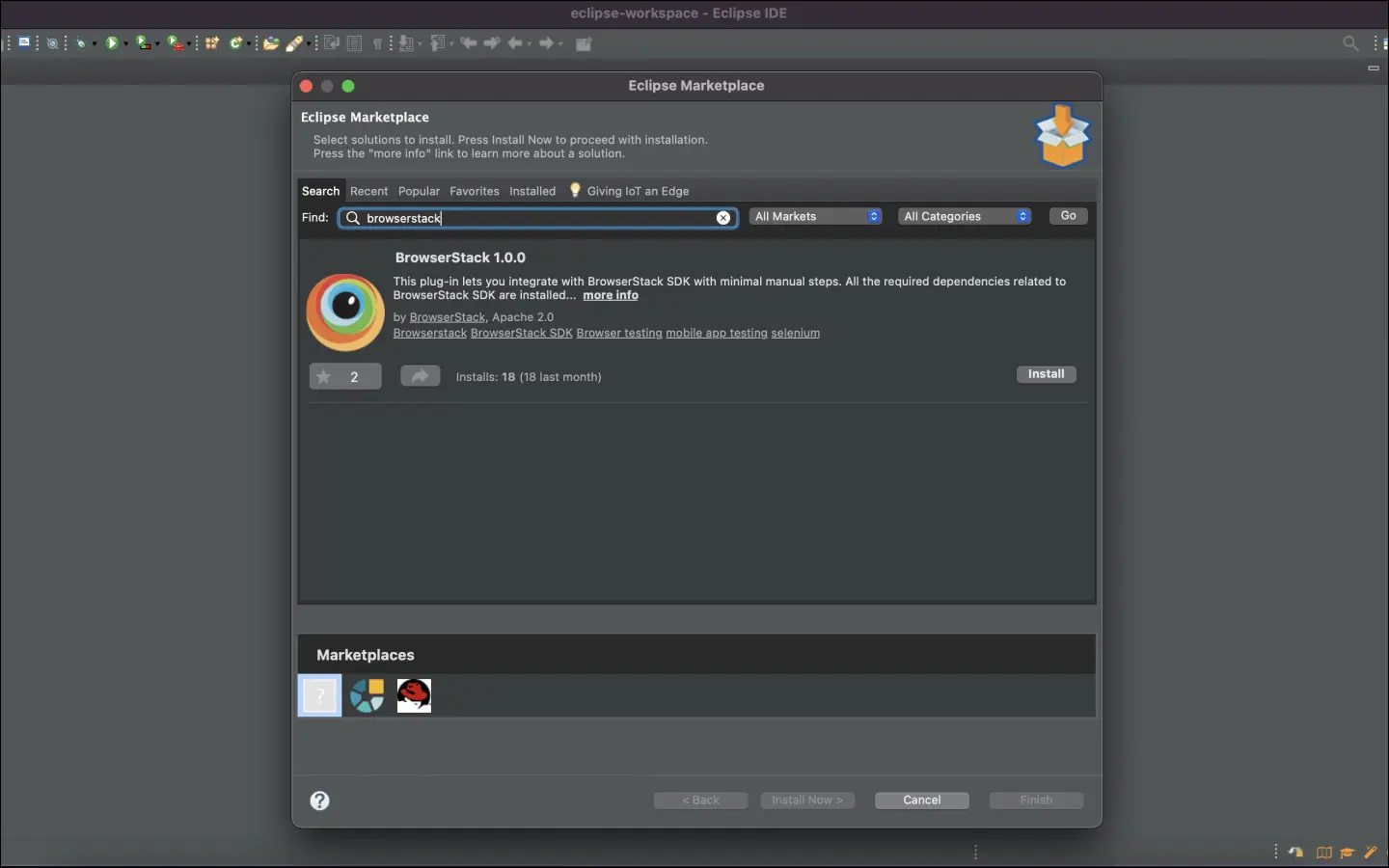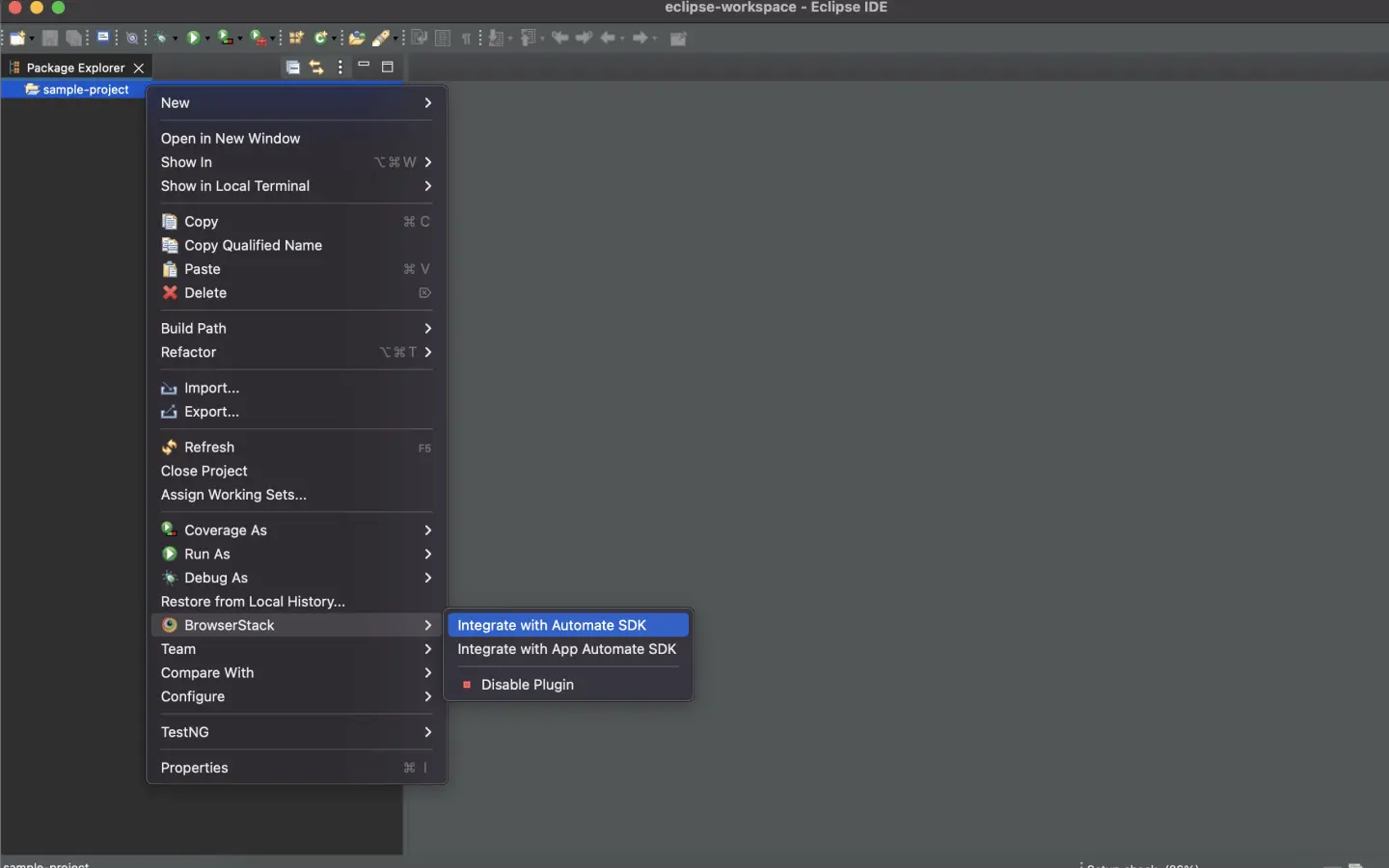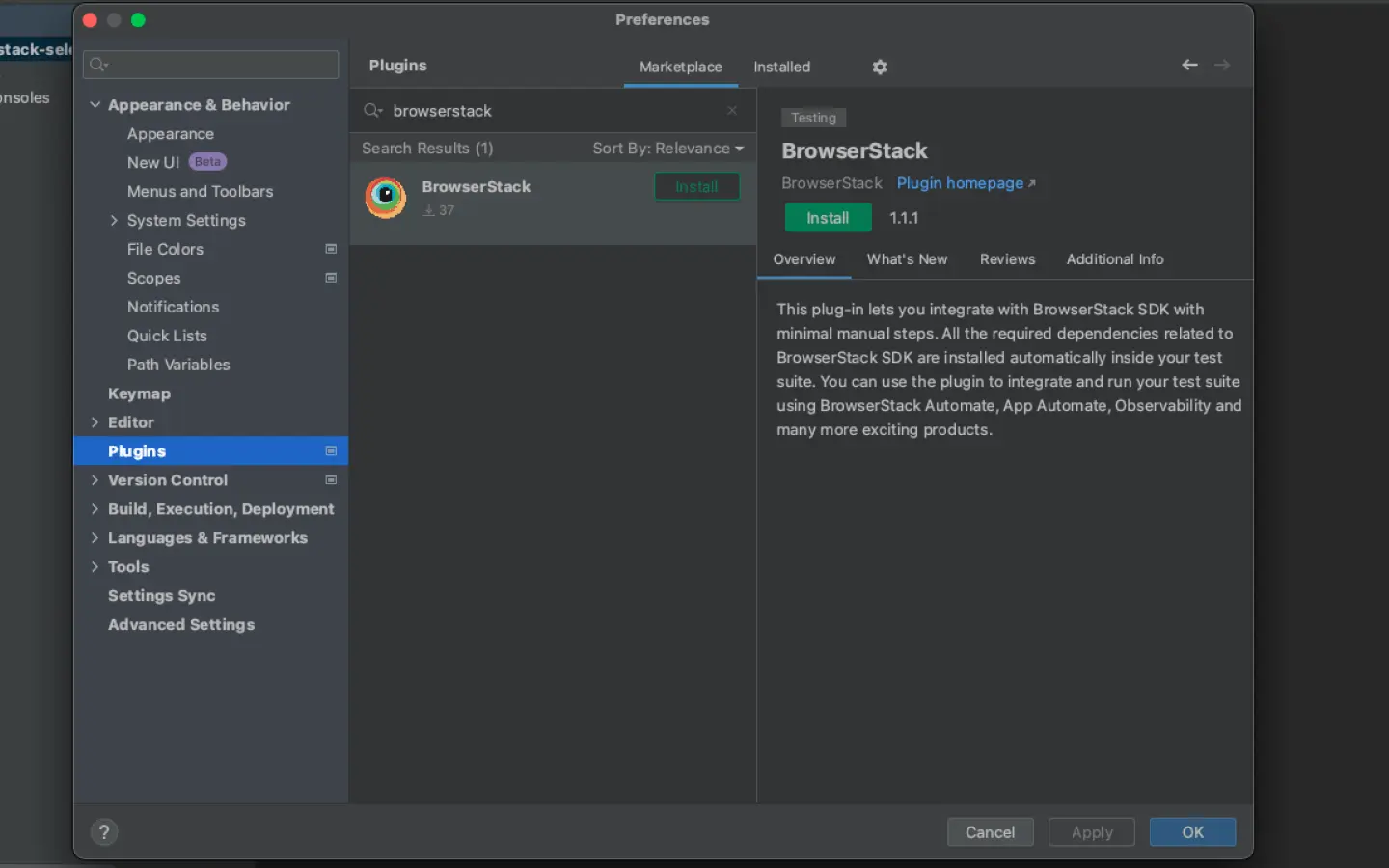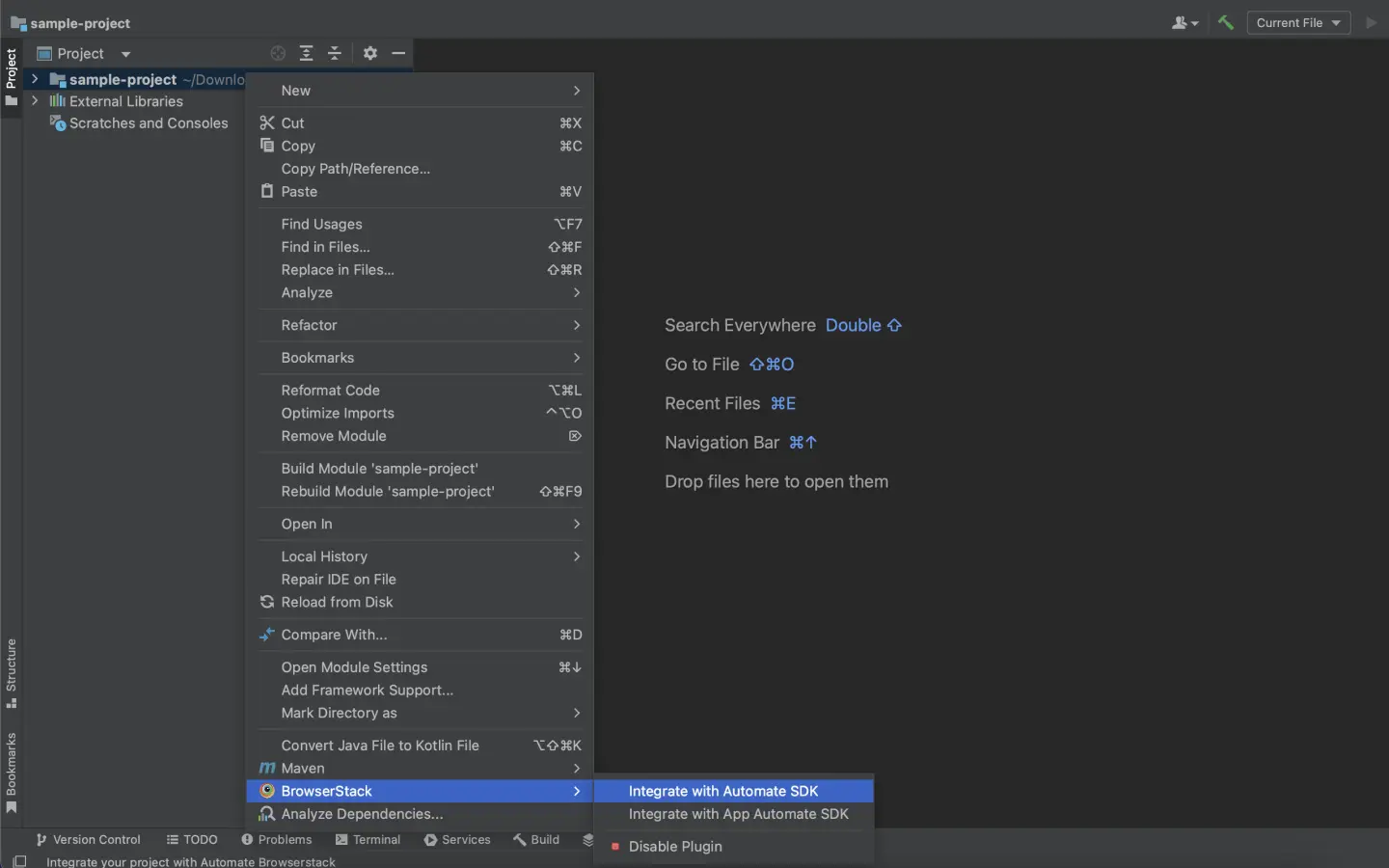Integrate your test suite with BrowserStack
BrowserStack’s TestNG SDK supports a plug-and-play integration. Run your entire test suite in parallel with a few steps!
Prerequisites
- An existing automated test suite.
- TestNG v6.8+, Java v8+ (If using Gradle, Java v9+ is required), selenium v2.5+ (JSON Wire / W3C).
-
Maven or Gradle is installed on your machine, its environment variables are set, and its bin is added to system path,
$PATH.
Integration steps
Based on the method you use to build your project, complete the steps in the following tabs to integrate with BrowserStack.
Install BrowserStack Plugin
On the Eclipse toolbar, click Help > Eclipse Marketplace.
In the Eclipse Marketplace, search for BrowserStack > click Install > Finish.

Configure your test suite with BrowserStack SDK
BrowserStack plugin automatically adds the browserstack-java-sdk dependency to your pom.xml file and generates a browserstack.yml configuration file.
Right-click on your project folder > BrowserStack > select Integrate with Automate SDK.

Select your Project Folder, Framework, and other BrowserStack Parameters, and then click Integrate.
Framework: testng
BrowserStack User Name: YOUR_USERNAME
BrowserStack Access Key: YOUR_ACCESS_KEY

Update your BrowserStack config file
Update your browserstack.yml config file at the root level of your project. This file holds all the required capabilities to run tests on BrowserStack.
Set platforms on which to test
Set the browsers / devices you want to test under the platforms object. Our configuration follows W3C-formatted capabilities.
| Platform | Browser |
|---|---|
| Linux | Firefox |
| Linux | Chrome |
| Linux | Edge |
Set number of parallel threads per platform
The parallelsPerPlatform property determines the number of parallel threads to execute. BrowserStack’s SDK runner selects the best strategy based on the configured value.
Example 1: If you have configured 3 platforms and set parallelsPerPlatform to 2: a total of 6 (3 x 2) parallel threads will be used on BrowserStack.
Example 2: If you have configured 1 platform and set parallelsPerPlatform to 15: a total of 15 (1 x 15) parallel threads will be used on BrowserStack.
BrowserStack Reporting
You can leverage BrowserStack’s extensive reporting features using the following capabilities:
| buildIdentifier | Description | Generated build name on dashboard |
|---|---|---|
| ${BUILD_NUMBER} (Default) | If the build is triggered locally, an incremental counter is appended. If build is triggered with CI tools, CI-generated build number is appended. |
bstack-demo 1 bstack-demo CI 1395 |
| ${DATE_TIME} | The timestamp of run time is appended to the build. | bstack-demo 29-Nov-20:44 |
Advanced use cases for build names
Custom formatting of build name
Prefix buildIdentifier with desired characters, for example, # or :
buildName: bstack-demo
buildIdentifier: '#${BUILD_NUMBER}'
Re-run tests in a build
You can re-run selected tests from a build using any of the following options:
Option 1: Set the existing build name in the BROWSERSTACK_BUILD_NAME variable and prepend it to your test run command to re-run tests in the same build:
Linux:
BROWSERSTACK_BUILD_NAME=“bstack-demo 123” mvn test -P sample-test
Windows Powershell:
$env:BROWSERSTACK_BUILD_NAME=“bstack-demo 123”; mvn test -P sample-test
Windows cmd:
set BROWSERSTACK_BUILD_NAME=“bstack-demo 123” && mvn test -P sample-test
Option 2: Set the build name as a combination of buildName and buildIdentifier, as seen on the dashboard, and set buildIdenitifier as null:
buildName: bstack-demo 123
buildIdentifier: null
Option 3: Set the buildIdentifier as the build number or time of the required build as seen on the dashboard:
buildName: bstack-demo
buildIdentifier: 123
sessionName is the name of your test sessions and is automatically picked from your test class/spec name. It doesn’t need to be set manually when using the BrowserStack SDK.
Use additional debugging features
BrowserStack offers session logs, screenshots of failed commands, and a video of the entire test, with additional options to enable.
Use Automate Turboscale
Update your browserstack.yml file
Copy the given code snippet and replace contents of browserstack.yml file in the root folder of your test suite.
userName: YOUR_USERNAME
accessKey: YOUR_ACCESS_KEY
framework: testng
platforms:
- os: Linux
browserName: Firefox
browserVersion: latest
parallelsPerPlatform: 1
browserstackLocal: true
buildName: bstack-demo
buildIdentifier: ${BUILD_NUMBER}
projectName: BrowserStack Sample
testObservability: true
debug: true
video: true
networkLogs: true
consoleLogs: info
turboScale: true
turboScaleOptions:
gridName: sample-gridnameRun your test suite
You can continue running your tests as you have been previously.
We're sorry to hear that. Please share your feedback so we can do better
Contact our Support team for immediate help while we work on improving our docs.
We're continuously improving our docs. We'd love to know what you liked
We're sorry to hear that. Please share your feedback so we can do better
Contact our Support team for immediate help while we work on improving our docs.
We're continuously improving our docs. We'd love to know what you liked
Thank you for your valuable feedback!





